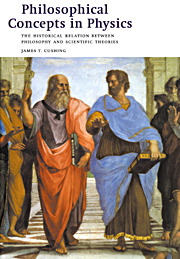 Philosophical Concepts in Physics
Philosophical Concepts in Physics Book contents
- Frontmatter
- Contents
- Preface
- Copyright acknowledgments
- PART I The scientific enterprise
- PART II Ancient and modern models of the universe
- 4 Observational astronomy and the Ptolemaic model
- 5 The Copernican model and Kepler's laws
- 6 Galileo on motion
- PART III The Newtonian universe
- PART IV A perspective
- PART V Mechanical versus electrodynamical world views
- PART VI The theory of relativity
- PART VII The quantum world and the completeness of quantum mechanics
- PART VIII Some philosophical lessons from quantum mechanics
- PART IX A retrospective
- Notes
- General references
- Bibliography
- Author index
- Subject index
6 - Galileo on motion
Published online by Cambridge University Press: 05 June 2012
- Frontmatter
- Contents
- Preface
- Copyright acknowledgments
- PART I The scientific enterprise
- PART II Ancient and modern models of the universe
- 4 Observational astronomy and the Ptolemaic model
- 5 The Copernican model and Kepler's laws
- 6 Galileo on motion
- PART III The Newtonian universe
- PART IV A perspective
- PART V Mechanical versus electrodynamical world views
- PART VI The theory of relativity
- PART VII The quantum world and the completeness of quantum mechanics
- PART VIII Some philosophical lessons from quantum mechanics
- PART IX A retrospective
- Notes
- General references
- Bibliography
- Author index
- Subject index
Summary
In this chapter we present a prelude to the foundations of modern mechanics that is basically the study of the descriptions and of the causes of the motion of bodies. Aristotle and Galileo are the historical characters on whose work we focus. As we pointed out in Chapter 3, it is important to appreciate that all developments in science take place against the historical, philosophical and social backgrounds in which the scientists find themselves. All scientists, no matter how singularly gifted, build upon the work of their predecessors, even when they overturn old beliefs and theories. Unlike the Athena of Greek mythology who emerged full grown from the head of Zeus, new theories in science do not materialize in final form from one mind working in isolation, but are developed as part of a larger movement. That theme, to which we return often in this book, is well illustrated in the following.
THE IMPETUS THEORY
Over the centuries there were numerous transcriptions and translations of Aristotle's works, as well as endless commentaries upon them. Not all those who studied the Aristotelian tradition were uncritical of it. This was especially true for Aristotle's position that ‘unnatural’ motion required the action of an external agent. Hipparchus, perhaps the greatest astronomical observer of antiquity, expressed somewhat vaguely the concept of an impressed force that was transmitted to a moving body. This impressed force was gradually dissipated by the surrounding medium so that the body eventually came to rest.
Information
- Type
- Chapter
- Information
- Philosophical Concepts in PhysicsThe Historical Relation between Philosophy and Scientific Theories, pp. 74 - 86Publisher: Cambridge University PressPrint publication year: 1998